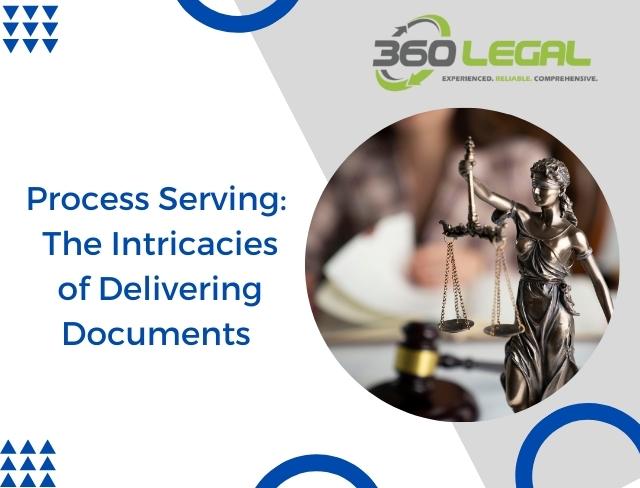Process Offering: An Essential Step in Legal Record Shipment
Refine offering plays a vital duty in the legal framework, making certain that all parties are properly informed of pending lawful activities. Various types of legal papers are offered, each with its own implications and demands. Recognizing the subtleties of these challenges is important, as they can have extensive ramifications for the honesty of lawful proceedings.
Importance of Process Serving
Process serving is a crucial component of the legal system, working as the formal methods through which people are alerted of lawful actions including them. This procedure is essential as it guarantees that all parties receive correct notification, consequently maintaining the principles of due process and reasonable representation in lawful procedures. Without efficient process offering, people may remain not aware of legal actions, possibly resulting in judgments made in their absence and significant effects.
The value of process offering prolongs beyond plain alert; it likewise adds to the integrity and effectiveness of the judicial system. Correctly served papers permit timely feedbacks from the parties entailed, assisting in the progression of instances with the courts. Additionally, adherence to lawful demands bordering process offering lessens the chances of disagreements concerning solution, thus reducing hold-ups in legal procedures.
Moreover, procedure serving serves as an important guard against unimportant suits. By making certain that accuseds recognize claims versus them, it helps to prevent baseless actions and urges responsible legal techniques. Ultimately, the function of procedure serving is foundational in keeping the rule of legislation and making certain that justice is available to all people associated with legal matters.
Kinds of Lawful Documents Served
Legal papers offered in the context of process serving include a large selection of materials vital for numerous kinds of legal action. Process Serving. These files can consist of summons, complaints, writs, and subpoenas, each serving an unique function in the lawful procedure
A summons is typically released to alert an offender of a lawful action and compel their appearance in court. Subpoenas are essential for engaging witnesses to produce or testify evidence, hence playing a vital duty in the exploration procedure.
Along with these key records, procedure servers might additionally provide activities, notices, or testimonies, depending upon the requirements of the instance. Each type of document offered is regulated by specific lawful policies and treatments, highlighting the importance of prompt and accurate solution. Ultimately, the reliable delivery of these lawful documents is critical in making sure that all parties are educated and that the judicial process can continue without delay.
Obstacles Faced by Process-server
Various obstacles confront process-server in the execution of their obligations, frequently making complex an already elaborate lawful landscape. One significant obstacle is situating individuals who are incredibly elusive or purposely avoiding solution. This usually requires substantial investigatory skills and resources, as procedure web servers must navigate false addresses and restricted details.
Moreover, process servers regularly run into hostile situations. Serving papers can prompt protective responses from recipients, leading to conflicts that endanger the web server's safety and security. Legal protections for process servers vary by territory, including one more layer of intricacy to their job.
Time restraints web link additionally posture a critical challenge. Numerous legal files have stringent due dates, and stopping working to serve them in a timely way can result in severe legal effects for customers. This stress can be worsened by the demand to comply with specific guidelines governing service approaches.

Process Offering Techniques
How do process-server properly make sure that legal papers reach their intended receivers? The methods used in process offering are important for the effective shipment of these records. The most usual method is individual service, where the process-server hands the papers directly to the recipient. This technique is preferred for its dependability, as it provides a clear record of distribution.
In enhancement to individual service, alternate approaches such as replaced service can be used. This entails supplying files to a person of appropriate age and discernment at the recipient's residence or company, making sure that the records reach the intended celebration indirectly - Process Serving. One more approach is solution by mail, which might be permitted in certain jurisdictions, enabling documents to be sent out via certified or registered mail to offer evidence of shipment
Last but not least, digital solution is obtaining grip, especially in scenarios where conventional techniques may show tough. This can consist of emailing papers or using court-approved digital filing systems. Each technique has its own set of regulations and guidelines, making it vital for procedure servers to be knowledgeable concerning the legal needs in their jurisdiction to guarantee compliance.
Legal Effects of Improper Service
When process serving is not carried out effectively, considerable legal consequences can develop, weakening the validity of the whole lawful case. Incorrect service can bring about a termination of the situation, as the court may determine that the offender was not adequately educated of the legal action versus them. Process Serving. This termination can occur also look at more info if the complainant has a strong instance, successfully nullifying their resources and initiatives purchased the lawsuits process
Additionally, inappropriate service might lead to delays, creating further complications in the lawful timeline. If a defendant is not effectively served, they might not know their obligation to react, resulting in defaults that make complex the resolution of the case. In some territories, the plaintiff might be required to re-initiate the solution process, sustaining additional expenses and extending the timeline of the situation.
Moreover, duplicated failings in service can mirror badly on the complainant's legal advice, possibly resulting in specialist repercussions or permissions. Therefore, making sure correct process offering is not just a procedural demand yet a vital part that upholds the stability of the lawful system and protects the legal rights of all events involved.

Verdict
To conclude, procedure offering plays an indispensable role in the legal system by ensuring that all parties receive correct alert of lawful activities. The different sorts of files offered, coupled with the challenges faced by process-server, highlight the intricacies intrinsic in this profession. Utilizing suitable methods of service is critical to support due process, and any kind of failure to stick to lawful standards can cause considerable consequences, weakening the integrity of judicial procedures.
Process serving plays a crucial function in the legal framework, ensuring that all events are appropriately alerted of pending legal activities.Refine offering is an important element of the lawful system, offering as the official means by which people are alerted of legal activities entailing them. In addition, adherence to legal requirements bordering process offering lessens the chances of disagreements relating to service, therefore decreasing hold-ups in legal process.
When process offering is not performed properly, considerable legal consequences can arise, weakening the validity of the entire lawful proceeding.In final thought, procedure serving plays an indispensable function in the lawful system by guaranteeing that all events receive correct notification of legal activities.